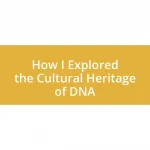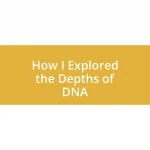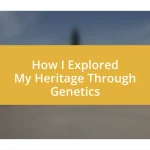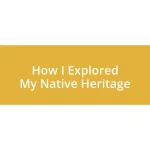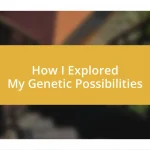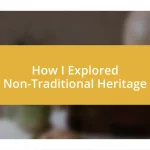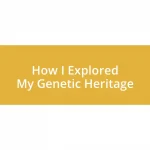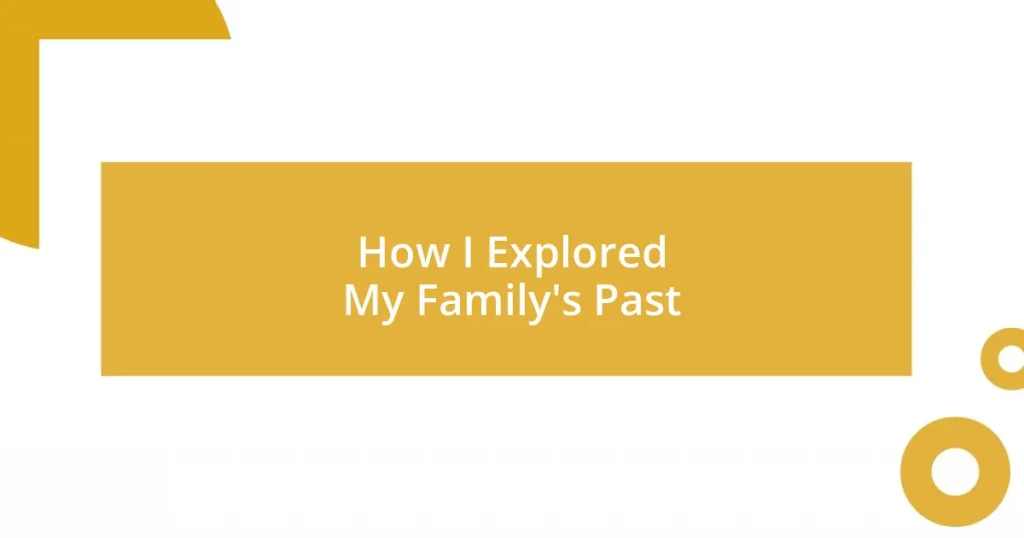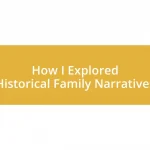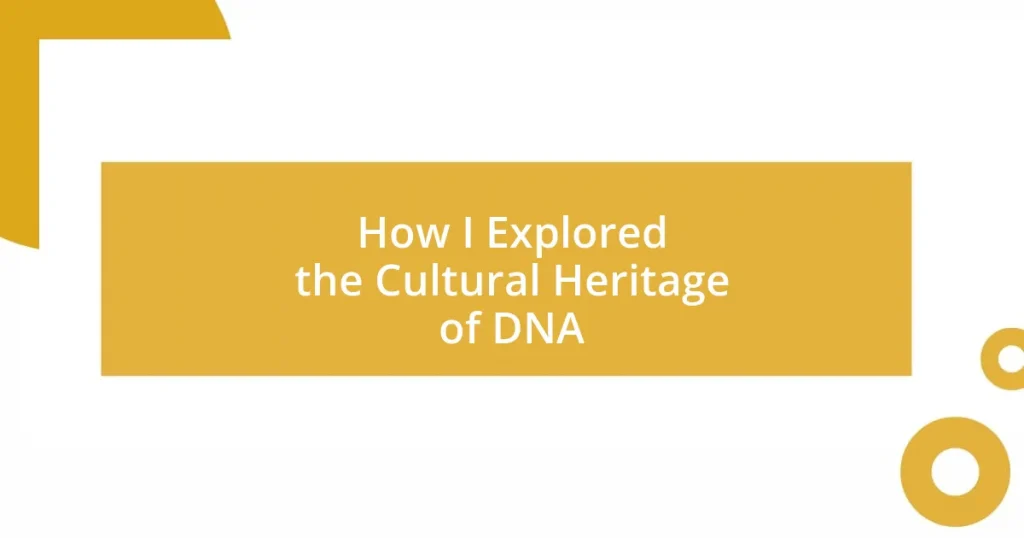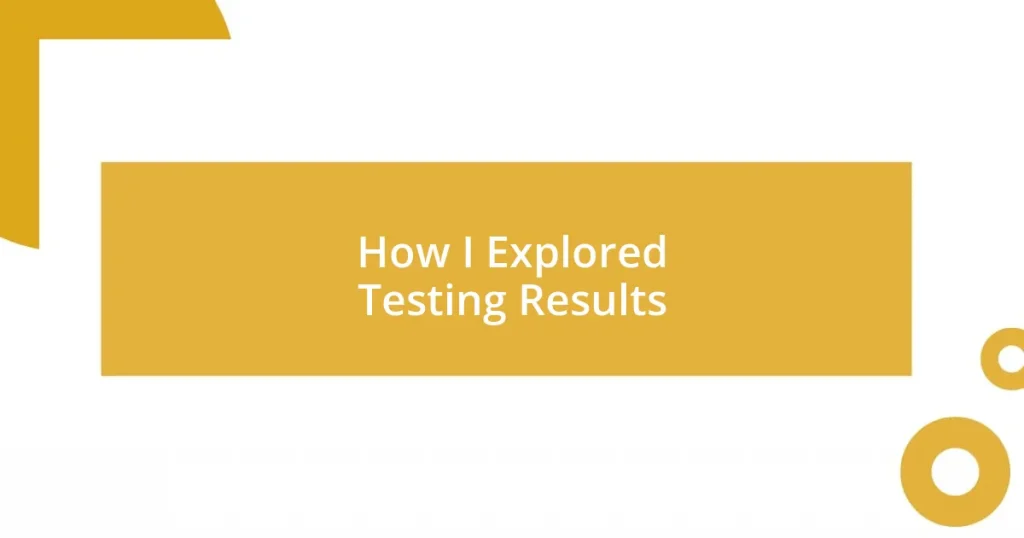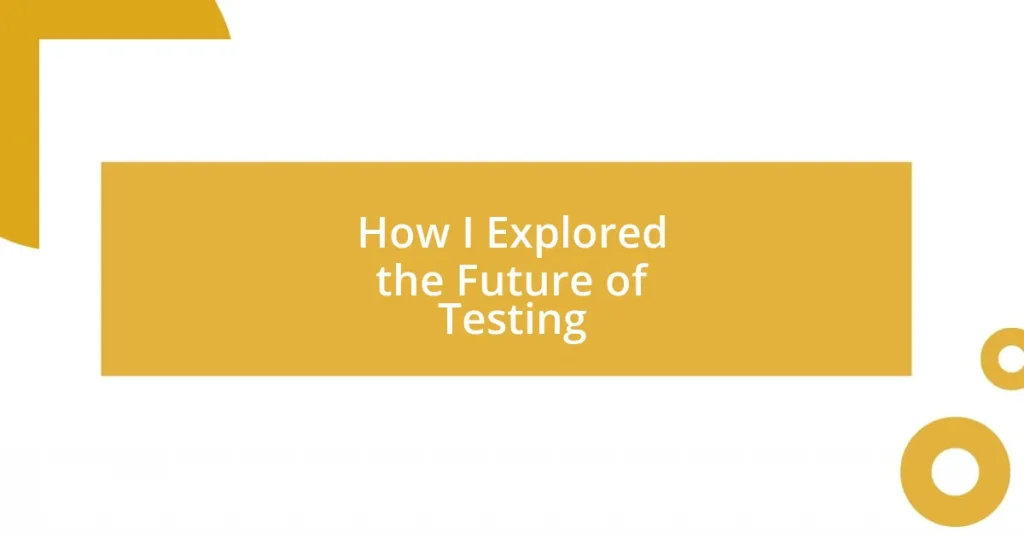Key takeaways:
- Understanding family history involves exploring shared stories, values, and sacrifices, providing insight into personal identity.
- Utilizing a variety of research tools, such as online databases, local libraries, and DNA testing, enhances the exploration of family lineage.
- Interviewing relatives uncovers personal narratives that enrich family history and highlight resilience and sacrifices of ancestors.
- Preserving family heritage requires documenting stories and artifacts, ensuring that past experiences and emotions remain connected to future generations.
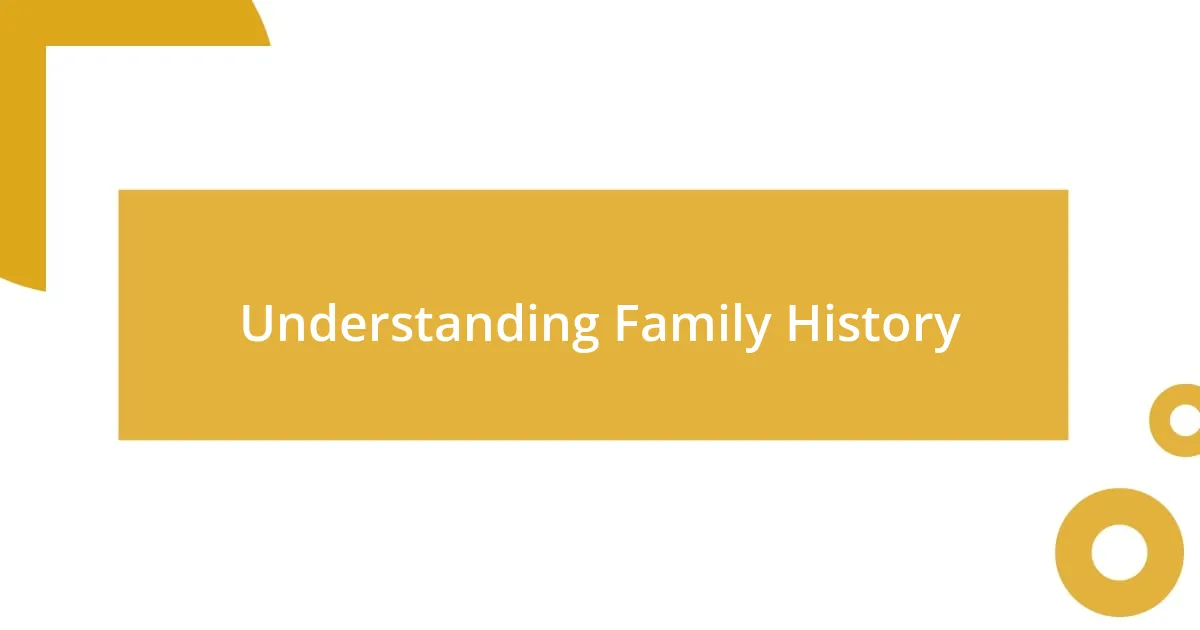
Understanding Family History
Understanding family history isn’t just about dates and names; it’s a journey into the heart of who we are. I remember flipping through old photo albums my grandmother had tucked away. The faded pictures of her youth were like windows into another world, each snapshot sparking a question: What were her dreams at that age?
As I delved deeper, I realized that family history is intertwined with our shared stories and values. It’s fascinating to learn about the sacrifices my ancestors made to provide for future generations. I often wondered how their struggles shaped my own family dynamics. Could understanding their past help me navigate my present?
Exploring family history evokes a mix of pride and heartache. One day I stumbled upon a letter my great-uncle wrote during the war, full of longing and hope. Reading his words made me think—what burdens have my family carried that I might unknowingly reap the benefits of today? Understanding our lineage gives us a sense of belonging and helps us appreciate the sacrifices made by those who came before us.
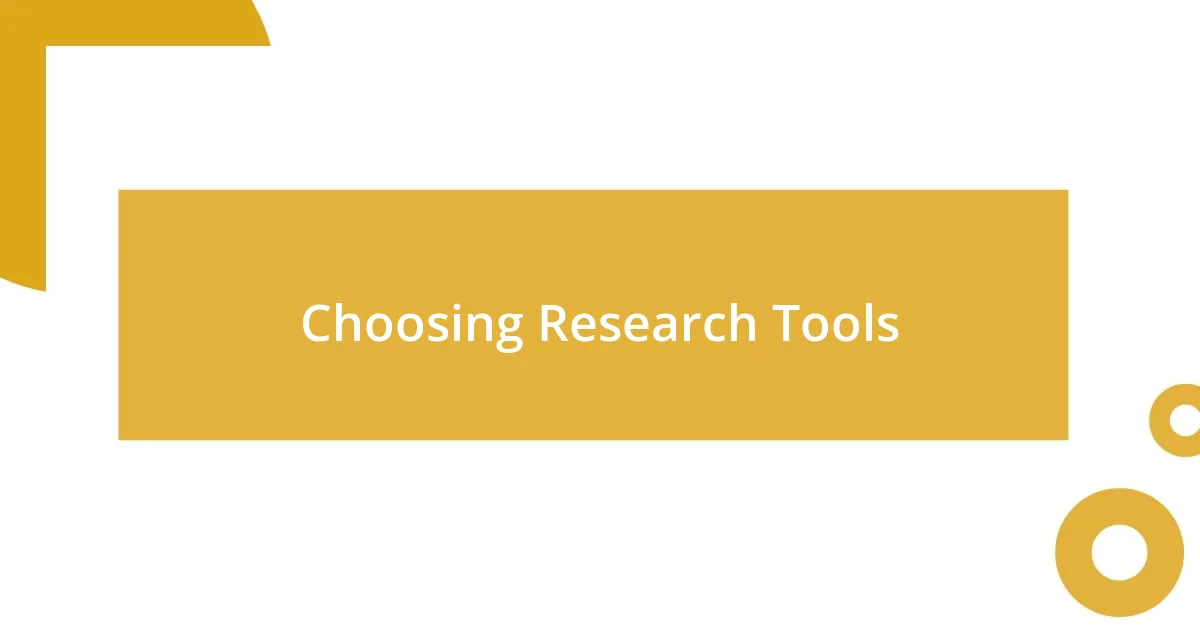
Choosing Research Tools
Choosing the right research tools can significantly enhance your family history exploration. I found that starting with online databases such as Ancestry.com or FamilySearch.org opened up a treasure trove of information. What amazed me was the user-friendly interfaces that allowed me to sift through census records and immigration files without feeling overwhelmed.
I also discovered that local libraries and historical societies can be goldmines for primary sources. They often host genealogy workshops, where I connected with others who shared my passion. Talking to people in these settings often leads to unexpected discoveries; I still remember the librarian who pointed me to a musty old book that contained my great-grandfather’s obituaries.
Moreover, don’t overlook the value of DNA testing kits. I decided to take one, which not only confirmed some family stories but also introduced me to distant relatives I’d never known. The emotional connection I felt upon discovering a cousin was indescribable; it highlighted the bonds we share and the stories waiting to be uncovered.
| Research Tool | Description |
|---|---|
| Online Databases | Websites like Ancestry.com and FamilySearch.org provide access to historical records, making it easy to trace lineage. |
| Local Libraries | Often house unique resources and conduct workshops, allowing face-to-face interactions with skilled genealogists. |
| DNA Testing Kits | Helps to uncover biological connections and can lead to discoveries of unknown relatives. |
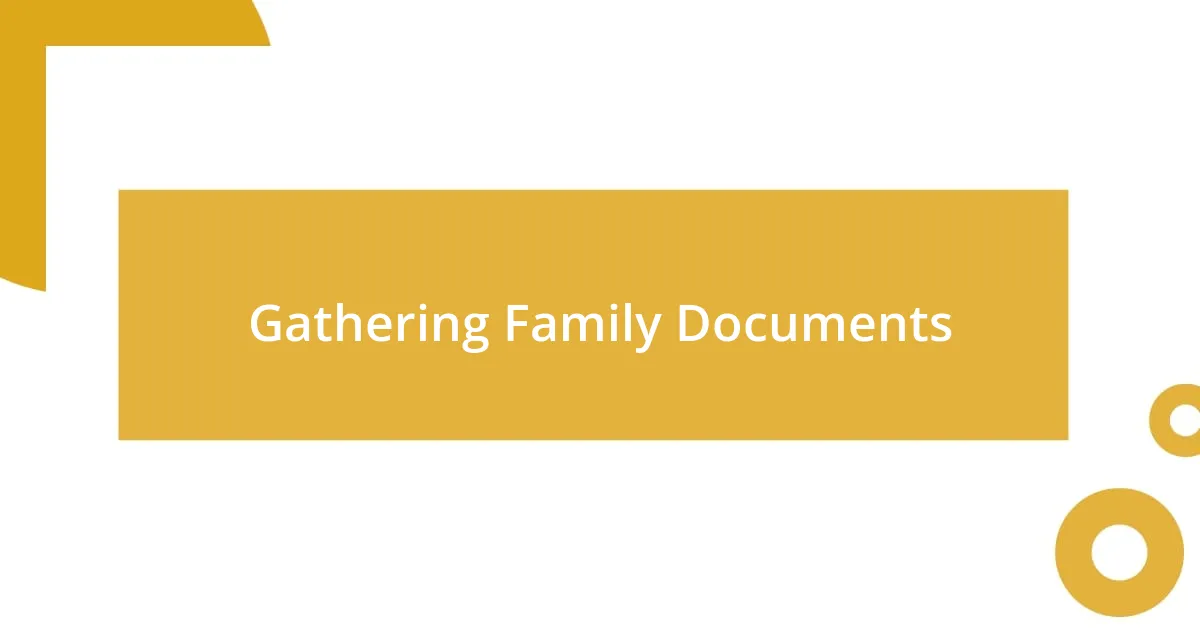
Gathering Family Documents
Gathering family documents was one of the most rewarding stages of my journey. I often felt like a detective piecing together clues from the past. Sifting through piles of old letters and certificates, I came across my parents’ marriage license tucked into a shoebox. It wasn’t just a piece of paper; it was a tangible connection to their love story and the life choices they made. Each document I found had a story to tell, like the birth certificates that revealed unexpected family names or the old passports that hinted at adventure across the seas.
To guide your own search for family documents, consider these essential sources:
- Birth and Death Certificates: These provide fundamental details about your ancestors’ lives and can lead to more information.
- Marriage Licenses: They not only mark significant life events but may also reveal parental names and origins.
- Old Letters: Personal correspondence can uncover emotions and insights into daily life and relationships.
- Military Records: These can offer fascinating glimpses into the lives and struggles of your family members during significant historical events.
- Immigration Papers: They might document the journey of your ancestors, telling stories of hope and new beginnings.
Each piece I discovered brought me closer to understanding not just who my family was, but also who I am today.
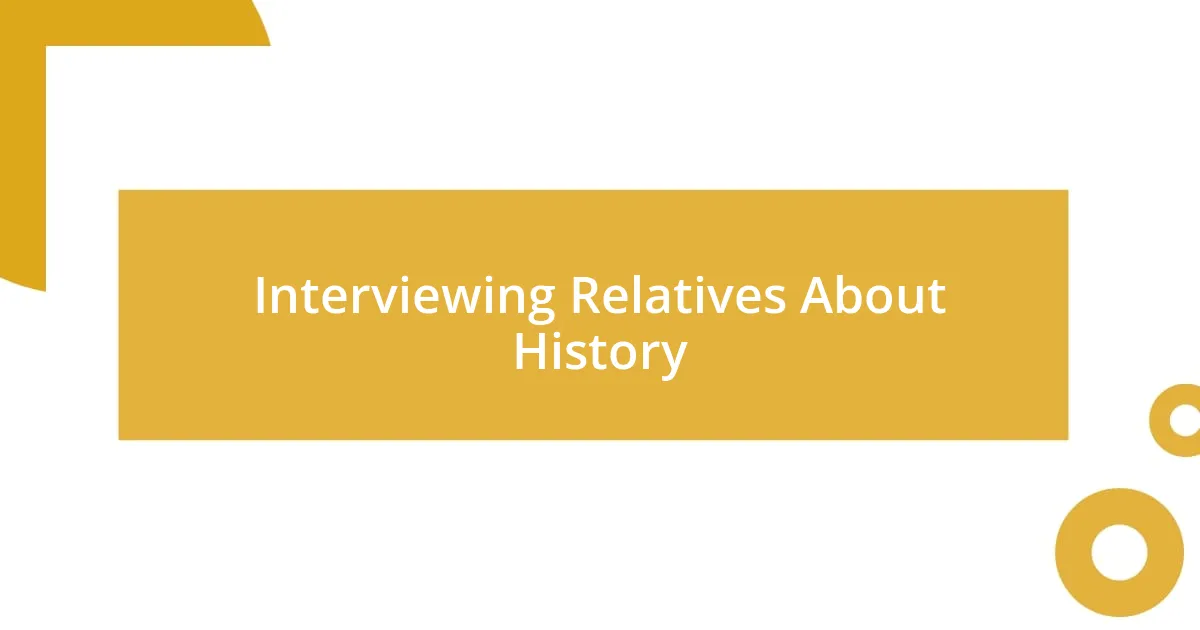
Interviewing Relatives About History
Interviewing relatives about family history is a priceless opportunity to uncover personal stories that aren’t found in public records. I remember sitting down with my grandmother one afternoon, her eyes lighting up as she recounted her childhood memories. It felt like stepping into a time machine; her tales of the old neighborhood and the traditions they held made history come alive in a way I had never experienced before.
As I delved into conversations with my aunts and uncles, I found that each person brought a unique perspective. One of my uncles shared anecdotes about our family during major historical events, connecting personal triumphs and hardships to broader narratives. Listening to him speak, I couldn’t help but wonder how many similar stories remain untold within other families, perhaps waiting for someone to ask.
What struck me most was the emotional depth behind these stories. When my aunt shared her recollection of my great-grandmother’s immigration journey, I felt a wave of pride and sadness wash over me. How often do we overlook the hardships our ancestors faced? Asking the right questions allowed me to understand not only their past but also the resilience that continues to shape our family today.
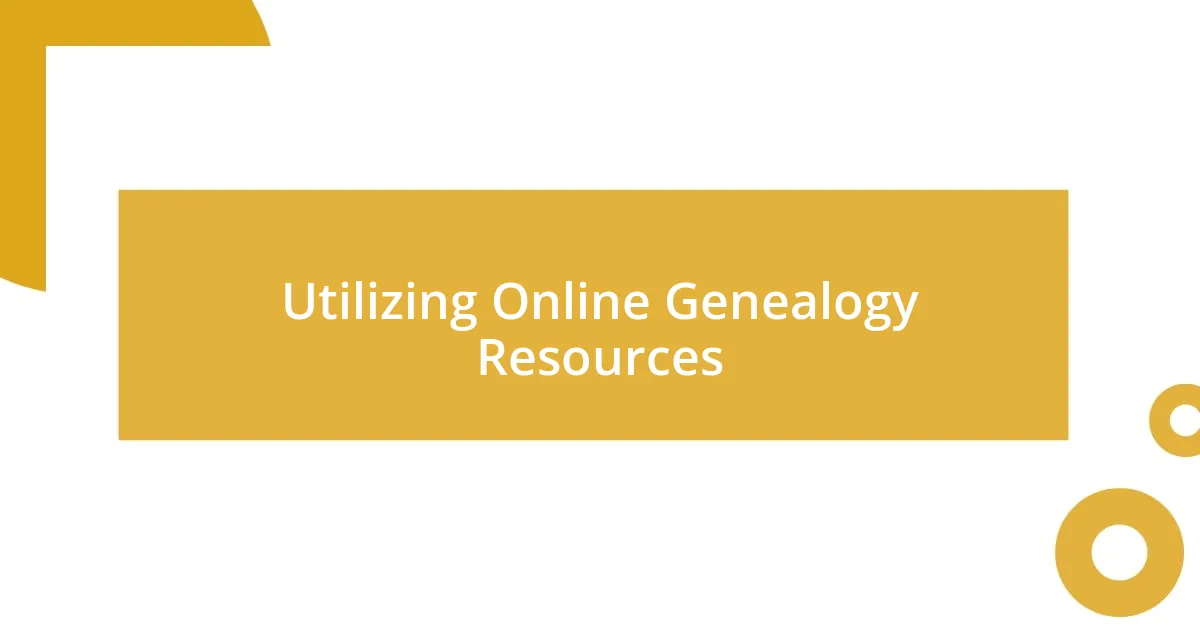
Utilizing Online Genealogy Resources
Utilizing online genealogy resources opened up a treasure trove of information that I could access from the comfort of my home. I remember spending hours on various genealogy websites, clicking through virtual archives and databases. It felt like wandering through a vast library where every corner held the potential for discovery. When I uncovered a family tree that extended back several generations, my heart raced. How was it possible to connect with relatives I had never met, yet who shaped my family history?
One of my most unforgettable finds was an old newspaper article that mentioned my great-grandfather’s small-town business. The article described how he helped the community during a difficult time, providing jobs and support to neighbors in need. This information provided a sense of pride I never anticipated. I couldn’t help but think, how often do we overlook the importance of these seemingly mundane details? Online resources offer access to such gems, allowing us to rediscover the remarkable contributions of our ancestors.
Additionally, engaging with online genealogy communities provided a nurturing environment filled with shared goals and experiences. I felt a sense of camaraderie with others on similar quests, exchanging tips and encouragement as we unraveled our respective family histories. I often found myself pondering—what if every family member has a story waiting to be told, but only if we take the time to seek them out? Embracing the digital world of genealogy has surely expanded my understanding of what it means to belong to a family, connecting me more deeply to the past.
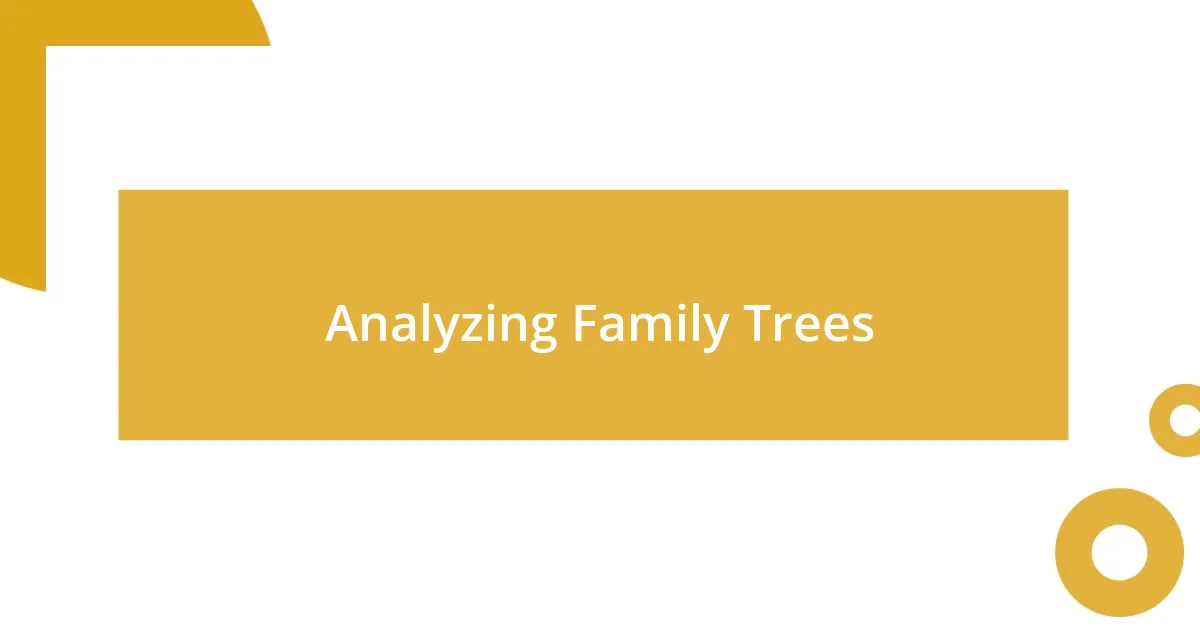
Analyzing Family Trees
Analyzing family trees can feel like piecing together a captivating puzzle. Each branch and leaf represents a story waiting to be uncovered. I vividly recall the moment I stumbled upon my great-great-grandfather’s line. The more I explored, the more I could visualize the lives these ancestors led—what they might have endured and achieved. Isn’t it fascinating to think about the sacrifices they made that molded the lives we live today?
As I traced back my family tree, I noted several significant migrations and relocations. One branch moved from Europe to America in search of opportunity, while another settled in a small town in the Midwest. I found myself wondering how their experiences shaped their identities. Did they face challenges that are echoed in my own life today? The emotional weight of these discoveries often left me reflecting on our family’s resilience.
One of my favorite aspects of building family trees is the realization that some branches may never connect due to lost records or lack of documentation. It’s both frustrating and intriguing. I sometimes think about how many histories might be lost in the shuffle, waiting for someone with the tenacity to dig deeper. Each little piece, whether confirmed or merely speculative, adds color to our shared human experience. How has your family journey reflected in your life choices? World events and personal histories intertwine in ways we might not fully comprehend until we take the time to analyze the family trees that bind us.
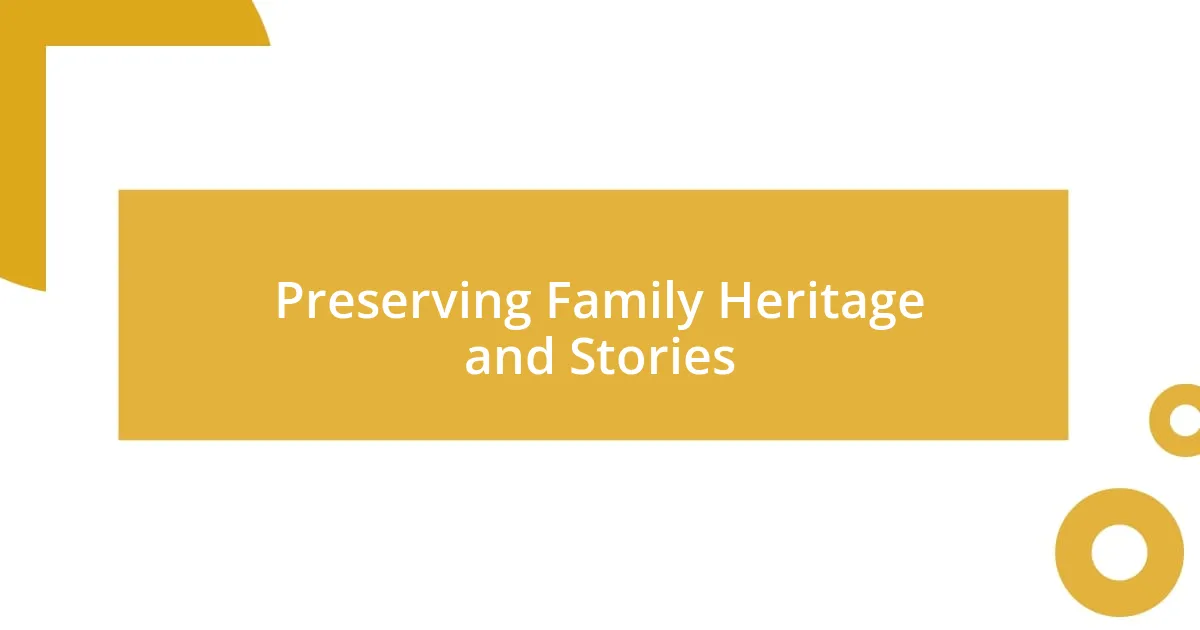
Preserving Family Heritage and Stories
Preserving family heritage is not just about keeping old photographs or heirlooms; it’s about safeguarding the stories that give those artifacts meaning. I remember sitting down with my grandmother, listening to her recount tales of her childhood during a time of significant change. Each story revealed a layer of our family identity, connecting me not only to her but to the generations that preceded her. Have you ever felt that rush of emotion when a memory unfolds, bridging the past with the present?
The act of documenting these stories can take many forms, from writing them down in journals to recording video interviews. I chose to create a family history scrapbook, combining snapshots with handwritten narratives that captured the essence of our relatives’ experiences. It’s incredible how a few simple words can bring faces to life and keep the spirit of those we love alive. I often wonder, how could such a simple act hold so much power in preserving our legacy?
As time passes, I become more aware of the impermanence of memories. I once overlooked the stories of my great-aunts until, one day, I found a box of their letters tucked away in the attic. Reading their words felt like opening a time capsule, filled with hopes, dreams, and struggles. It struck me—what if those letters had never been discovered? What other voices from my family’s past were fading into silence? This realization drives me to prioritize the preservation of our stories, ensuring that each generation has a window into our family’s rich tapestry.
